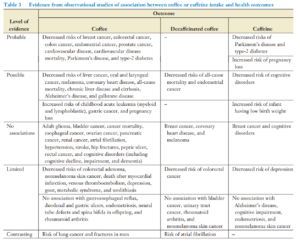Probably.
Oh, blessed coffee. Thank you dragging me from the depths of the underworld and allowing me the ability to stand on the edge of both order and chaos! Okay, I’ve been listening to a bit too much Jordan Peterson, lately, and it’s unlikely that dramatic. But, seriously. I can’t tell you how often folks state how terrible the world is without their cup of java. How unmotivated, depressed, cranky they are and how lame things seem… almost as if they are seeing the world in black and white, instead of vibrant high resolution and tons of color.
In North America, coffee tops all beverages except water for those which are most consumed, with about 2 out of every 3 adults taking coffee on a daily basis. I say “taking” coffee because it should be understood that coffee is a drug in a sense. As you know, it contains caffeine, which exerts effects on our physiology, which explains why without it, some folks only see the world in black and white.
That being said, coffee consumption is generally not considered a health-concious behavior, particularly in the circles of health I’m involved in, where experts and gurus make statements about how coffee will trash your adrenal glands and screw up your hormones. I’ll state now I don’t agree at all with the assertion that coffee does that directly, but rather facilitates behaviors that does. We’ll talk more about that another time.
What does coffee do for us?
Aside from the effects of caffeine, which most of us are aware of, coffee possesses phytochemicals categorized as polyphenols and proanthocyanins. They are incorrectly referred to as antioxidants. What these phytochemicals do is stimulate a positive adapative response by acting as mild oxidant stressors. You can think of it similarly to how weight training works. I can do bicep curls with an appropriate amount of stimulus that will make my biceps swole and stronger. I can also do an excessive amount that would provide excessive damage to my muscles and result in injury. As weight training results in adaptive responses that allow my musculature to handle heavier loads, the consumption of these phytochemicals allows my defense system against toxic insults from the environment to work more efficiently.
Additionally, there may be benefit to caffeine itself, evidenced by the differences in effect size noticed for risk reductions related to caffeinated versus decaffeinated coffee consumption.
An alternative argument
I was recently exposed to a different idea, which was attractive to me because I’m not completely sold on the idea of phytochemicals. Some folks argue that it has less to do with the phenolics and anthocyanins in coffee and more to do with the amount of coffee consumption may mean in a particular individual.
Caffeine has addictive properties. It often makes some folks more motivated and have a general sense of well being overall. And so when the effects of caffeine wear off, you reach for more. There are individual differences in caffeine metabolism, owed to an enzyme expressed in our liver’s detoxification pathways called cytochrome p450 1A2 (CYP1A2). In some folks, this enzyme results in higher sensitivity to caffeine and longer lasting effects and in others the exact opposite. Folks in the latter category have a tendency to drink more coffee, because of their CYP1A2 enzyme that works differently. Well this same enzyme also impacts how our bodies handle various environmental toxicants that do harm. Such things include toluene found in nail polish, aflatoxins found in food, and polycyclic aromatic hydrocarbons that contribute to air pollution.
The idea is that these folks that reach for more coffee also have a more robust defense against these environmental insults, which would result in less incidence of chronic disease and cancer. It’s really interesting to think about, and may explain the difference in effect size noted for caffeinated versus non caffeinated coffee.
And so coffee consumption is essentially a proxy for the capabilities of individuals to defend themselves against toxicants in the environment.
What does the science say?
A large review by Grosso and friends summarizes most of the findings. The authors state that there is a probable risk reduction from development of Parkinson’s disease, diabetes type II, cardiovascular-related death, and the development of cancers of the breast, prostate, endometrium and colon. You review this further, as well as what investigators think to be less likely in the table below.

The investigators think the sweet spot is somewhere between 3-5 cups of coffee a day. This is black coffee, without any added calories. There is more inconsistency beyond that point, with some studies suggesting more harm and others suggesting more benefit. There is less detail on how the coffee is prepared and for what particular individuals.
The authors point out that future studies should take into consideration CYP1A2 status, smoking status, alcohol consumption.
They express caution in the context of pregnancy and in folks with sensitivity to caffeine which often results in anxiety, insomnia, palpitations, and tremors. There is also some concern about bone loss in postmenopausal women.
What does this mean for you?
If you enjoy coffee, keep enjoying it. Without tons of extra calories.
Limit caffeine consumption if you’re pregnant.
The sweet spot for benefit is somewhere around 3-5 cups per day. Although there is mention in the study of a dose-dependent response to coffee consumption on risk, I wouldn’t suggest increasing your coffee consumption for this reason.
Your intolerance for coffee might warrant investigation of your CYP1A2 status, particularly if there is a history of chronic illness or there is history of cancer in the family. From here you can work with your health provider to ensure you’re minimizing exposures and optimizing your defenses.
Further reading:
Review of coffee intake and various health outcomes.
Grosso, Giuseppe, et al. “Coffee, caffeine, and health outcomes: an umbrella review.” Annual review of nutrition 37 (2017): 131-156
CYPA1A2 enzyme differences between individuals and incidence of disease
Wang, Hongge, et al. “CYP1A2 rs762551 polymorphism contributes to cancer susceptibility: a meta-analysis from 19 case-control studies.” BMC cancer 12.1 (2012): 528

Billy Mitchell is a medical student wrapping up his 4th year at Southwest College of Naturopathic Medicine. His areas of interest include rheumatology and environmental medicine.